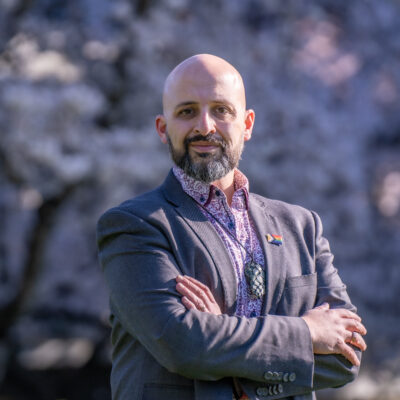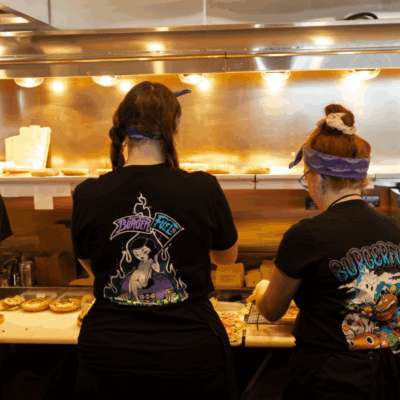MBA: DEGREE OF CERTAINTY
“Life-changing” is how tutors and students alike describe the MBA. In these uncertain times it’s an investment that delivers clarity, purpose and direction for those who make the commitment. With […]
“Life-changing” is how tutors and students alike describe the MBA. In these uncertain times it’s an investment that delivers clarity, purpose and direction for those who make the commitment.
With the MBA dating back 113 years1, it’s understandable that its relevance and value could be questioned in our
modern world.
Professor Brad Jackson, MBA director at Te Raupapa-Waikato Management School, has been teaching the MBA for 24 years around the world and admits to having “a passion for lifelong learning”. He says people who question the programme
generally have one thing in common: they haven’t done one.
Jackson says all the alumni he’s in contact with describe the experience as “life-changing”.
People who study an MBA are taking responsibility. They’re recognising that in their management roles or future executive roles they are responsible for people’s lives and livelihoods.
“So why not search the world for best thinking and practice so they can be confident that they’ve done all they can to be best prepared for the responsibilities ahead?”
He says there’s a real pride and culture around the Waikato MBA, at both the Hamilton and Tauranga campuses. Their programme takes a problem-solving focus, not a disciplinary focus, and more of a practical approach not just an academic
one – addressing the problems businesses face on a daily basis.
“It’s about creating a lifelong community of learners,” he adds. “The MBA is timeless, and it’s even more critical in these uncertain times.”
While the delivery has changed with online technology and student-driven learning, the MBA’s purpose hasn’t, he says. In 2021 it’s still about preparing professionals for more general management and executive responsibilities, including setting up
their own businesses.
However, what is different, and satisfying, is the diversity of ethnicities and backgrounds of today’s MBA students.
As for the programme itself, Jackson says it’s not just about its economic business impact, it’s now also more about creating social, environmental and cultural impacts.
“It’s in keeping with the new corporate ethos of moving from a shareholder to a much broader stakeholder orientation.”
Where an MBA is based is a really important value proposition. He believes that in the Waikato MBA’s case that means greater involvement and ownership from local businesses, iwi and for-purpose organisations based in the vibrant Waikato and Bay
of Plenty regions.
He talks of a composite learning experience for their students, which encompasses a mix of internationally-trained academics and local business practitioners as teachers and guest speakers.
Creating an integrated ‘live’ learning environment with the local business community brings value to the classroom too. As an example, a recent global business course at Waikato saw student teams helping six locally-based companies with their export challenges.
Jackson sums up the Waikato MBA’s outcome as one of stronger purpose, direction and options for students. “They get a much better sense of who they are, and what they’re here to change. They soon realise they have many more options than they thought they had and will emerge with a very different plan around how they can impact both their organisations and their communities.”
RIGHT TIMING
Jackson sees the MBA as a means to make better sense of the world and your place within it, and therefore has even more relevance during challenging Covid times. He says during Covid he’s seen students even more committed and supportive in their
studies – finding a common purpose to get through the programme together.
It also helps that there is total flexibility in course timing and delivery, with courses offered part-time either evenings or weekends in a blended format.
“It’s important to take the long-term view and not lose sight of why you’re embarking on this study. Look to your peers, colleagues and our staff to create that community of support that will help get you through.”
He acknowledges the capstone high impact applied research project that completes the MBA is the toughest component, but also the most valuable in terms of learning and career direction.
Developing the ability to question the way things are done is one of the most valuable outcomes from the whole course experience, he says.
“Our students have a much bigger view of the world when they graduate.”
QUICK PAYBACK
Ken Lee, MBA director at AUT, explains how the MBA remains highly relevant in today’s business environment and represents excellent value for money.
“The payback is relatively short and there’s good evidence of enhanced career prospects, as well as added value for self-employed business owners who complete the programme.”
He says when graduates are asked if they would recommend the programme to others, the answer is an emphatic ‘yes’.
It’s the less tangible skills that set the MBA apart, he says, such as problem-solving, decision-making, working with diverse groups and exercising creativity and innovation when addressing business management issues.
“MBA students are required to articulate and defend their solutions to business problems, and this readily translates into adding value to the business world in general,” says Lee (pictured left).
The rich diversity of the studentsstudying MBAs also continues to be a factor in its appeal, and Lee emphasises the life-changing appeal of the qualification.
AUT’s MBA programme is significantly refreshed and restructured every two years and new elective courses for the 2022 MBA should contribute strongly towards course stimulation, says Lee. These courses include the likes of ‘Negotiation for Influence, Inclusion and Impact’, ‘Co-ignition, Intelligence, Ideas, Innovation’ (a design-thinking, business problem-solving focus),
‘The Future of Work’, ‘Digital Business and Transformation’ and ‘Peak Performance – Health and Wellbeing’.
Through technology-enhanced delivery (online and face-to-face) there’s a strong emphasis on analytics, problem-solving,
strategy thinking and change management, interwoven with all the necessary core skills, he explains.
“It’s all topped off with a very exciting Applied Business Project where the students identify a business challenge, problem
or opportunity and apply all the tools and techniques they’ve learnt to produce a report not just for their lecturer, but also the
business client.
“This is the ultimate in real-world experience and making an impact for business and industry,” says Lee. “I’ve seen a student
achieve a $1 million contract with a major company on the back of his report. Another student was offered a job at the conclusion of his presentation, while another was offered a seat on the board.”
He says the Applied Business Project is indeed life-changing. “To see students’ goals and aspirations being realised is incredibly rewarding, and humbling, for me.”
Those three letters ‘MBA’ after your name signal to the world that you’ve successfully navigated the academic and business
rigours of the programme. Potential employers, partners or colleagues know that you are more than capable of adding value
and making an impact. You’ve developed the confidence to have those conversations with the likes of the IT manager, HR
manager, marketing manager, and so on.
The immediate trends impacting AUT’s MBA delivery look exciting, with the arrival of micro-credentials (smaller, bite-sized
pieces of learning), ‘pick and mix’ options, flexible customised and personalised learning particularly around electives, as well
as an even greater connection with business and industry.
“Clearly markets and stakeholder expectations are changing,” says Lee. “The ability to lead and manage in today’s turbulent
environment is now critical.
“I talk about the need to focus on becoming an ‘intentional learner’. Making a conscious decision towards personal and
continuous improvement to add value and give yourself and your organisation that competitive edge. The MBA is the enabler.
“Remember, there is no better investment than the one you make in yourself. The MBA gives you a significant return on that investment.”
1 https://www.mbacentral.org/history-of-the-mba/
THE GRADUATE:SIMON HENSHAW, MBA WAIKATO:
FILLING THE KNOWLEDGE GAPS
Simon Henshaw was keen to fill some knowledge gaps across a number of areas in business management when he enrolled for the Waikato MBA.
Two years later, having completed the programme while working full-time and juggling other commitments, he has not only formed “some great friendships and business contacts” but also given his career a massive boost.
“I know it’s certainly opened some doors. It also gives you the confidence to seek out new opportunities,” says
Simon.
He admits he learnt a lot from his MBA colleagues as well as from the course content itself.
“One challenging aspect of the MBA is working with highly competitive and intelligent people. It teaches you
to collaborate and work with others a lot more than I expected. Some of the most rewarding but challenging
assessments were the group projects.”
Discipline and time management are key when studying an MBA, he says, and understandably Covid
presented additional stress and challenges for both studying and leading a team.
“From a business strategy perspective, it provided a real-life example of how external factors can change, and how adapting quickly to change is essential for businesses to thrive in a post-Covid world.”
Looking back, Simon’s surprised by how he was able to sustain his studies and avoid postponing papers – which
is an option thanks to the flexibility of the programme.
He was pleased to get it finished, “but it did feel odd that it was all done and you’re leaving behind an extended family whom you’ve spent a lot of time with.”
His advice to anyone thinking about an MBA is to talk to others who have done it.
“I received great advice by talking to former alumni of the Waikato Management School. You get a good understanding of the challenges involved, and how they’ve used their MBA to further their careers.”
THE GRADUATE: MAREE HADDON, MBA WAIKATO, CHIEF FINANCIAL OFFICER, THE WISE GROUP:
SEEING THE WORLD DIFFERENTLY
For recent graduate Maree Haddon, studying for her MBA was life’s short cut. “I wanted to break into a different type of role, and figured the MBA would help jump-start me,” she recalls. “I chose Waikato because the management school has a great reputation, and I liked being able to connect with the cohort locally.”
Over two years she loved the interaction with other students – testing ideas and theories.
“I loved that it wasn’t just learning from a book, it really was getting an understanding of topics from industry experts.”
Of course, blending her studies in with life, work and family was a juggling act. But, somewhat surprisingly, Maree says Covid didn’t have too much impact – apart from a switch to online delivery for one paper, and the ‘international experience’ substituted with Queenstown. “which was still amazing”.
Managing studies was a challenge and a true test of your time management skills, says Maree. “I found having a clear plan that broke down the bigger assignments into smaller steps helped, especially when you might not have huge blocks of time at once.
“I also set aside a dedicated block of time each week.
For me, it was Friday afternoons. That way it felt like another meeting, not something I was choosing to do.”
Maree was surprised by how much she was able to keep motivated to study, and she found the MBA both interactive and engaging. “The topics were mostly genuinely interesting so it was sometimes a case of needing to stop rather than to start!
“It was an odd feeling when I finished my MBA – I was relieved but definitely found myself looking around thinking ‘what next?’. Your brain becomes used to absorbing more knowledge.”
If you’re reading this and have doubts about your ability to go the distance, Maree’s advice is to give it a go. “Trust me, you will surprise yourself, and once its done, you’ll be so glad you pushed through.
“For me, the biggest benefit of the MBA was what it did to my thought process. It’s like your brain is ripped open and rewired. You start looking at things differently. It really helps you tackle problems from a different angle. “That is what will help the most with my career, becoming a more dynamic problem solver.”






